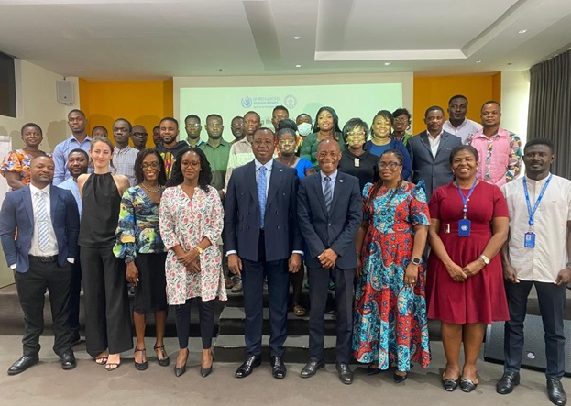A group photograph of the participating journalists and facilitators
A group of selected journalists have benefitted from training aimed at building the capacity of media actors on human rights issues as well as preventing hate speech.
The two-day programme, ongoing in Accra, also aims at building capacities of youth social media activists, bloggers and traditional media professionals to use digital space according to relevant norms and standard to enhance media advocacy.
The training, which is being organised by the Commission on Human Rights and Administrative Justice (CHRAJ) in collaboration with United Nation High Commission for Human Rights (OHCHR) also seeks to equip participants with skills to hold state actors and institutions accountable to human rights instruments and standards.
The Minister of Information, Fatimatu Abubakari in a speech read for her behalf, recognised the critical role journalists play in holding government accountable and advocating for human rights, indicating that, “your work is essential in shaping public discourse, exposing injustices, and amplifying marginalised voices.”
She said the workshop is timely, as the nation navigates complex challenges in its democracy.
“It’s crucial for journalists to have the knowledge and skills to effectively report on human rights issues, uphold ethical standards, and maintain the trust of the public,” she said.
Madam Abubakari noted that the current government is committed to protecting press freedom and ensuring the safety of journalist as enshrined in the Constitution, as well as promoting transparency and accountability through the enactment of the Right to Information (RTI) Act, 2019 and the Whistle Blowers’ Act.
She also pointed out that the government has facilitated the establishment of the Africa Office of the Independent Fund for Public Interest Media (IFPIM) in Accra, to provide funding opportunities for capacity development.
Commissioner of CHRAJ, Dr. Joseph Whittal, underscored the importance of the training due to the gatekeeping role of journalists in society and the fact that human rights are constantly under pressure across the globe.
He observed that there exist serious human rights concerns which demand collective action, particularly, in the context of protection of the rights of vulnerable groups.
He said journalists have sadly contributed to fueling public disdain against migrants and sexual minorities, citing for example, prejudiced reporting of “Fulanis” as responsible for every highway robbery and issues concerning the LHBTQ community.
“Overall, the workshop will seek to enhance the capacity of journalists, deepen the knowledge base of journalists, exploring how human rights principles intersect with journalism, the ethical considerations in reporting, and mitigating challenges faced by journalists working in environments where human rights and fundamental freedoms are constantly under threat,” Dr. Whittal added.
President of the Ghana Journalists Association (GJA), Albert Kwabena Dwumfuor, on his part noted that in a world where facts are often disputed and misinformation, disinformation and fake news spread quickly, capacity building like this is crucial to equip the media to be able to withstand any shock.
He said the media, which are the guardians of truth, the watchdog of democracy, and the voices of the voiceless, should and must be seen to be discharging that role dispassionately, a failure of which would amount to neglect of its mandate.
A representative from the OHCHR, Robert Kotchani, observed that the country has over the past years recorded significant efforts in terms of advancing human rights.
He said at the level of the country’s engagement with the Universal Periodic Review (UPR), the reinforcement of its national human rights institutions, and attempts to adopt bills, such as the death penalty partial abolition or the bill on proscribing the declaration, accusation, naming or labelling of another person as a witch in Ghana, among others are in the right direction.
He said freedom of the media is essential to enable democratic, free and participative societies, adding that, “this is why there is a need to enhance the capacity of journalists to better report and follow up on key human rights developments in the country such as the recent UPR and engage with human rights mechanisms to promote human rights as well as to address protection issues for journalists but also to prevent hate speech.”
BY Gibril Abdul Razak


